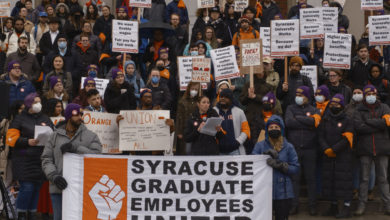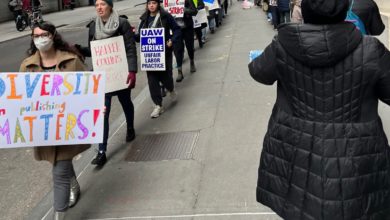The first weeks of 2022 have seen the the ongoing struggle for sovereignty by the Gayogo̱hó꞉nǫʼ (Cayuga Nation) in New York State escalate dramatically.
On Jan. 23, in Seneca Falls, N.Y., the Gayogo̱hó꞉nǫʼ Council of Chiefs gave a press conference on their struggle for sovereignty. Sachem Sam George of the Council of Chiefs delivered a statement denouncing Clint Halftown — the “federal representative” of the Gayogo̱hó꞉nǫʼ recognized by the U.S. Department of the Interior, Bureau of Indian Affairs. George recounted Halftown’s “terrorist acts [that] continue to torment the Cayuga citizens,” and called upon the federal government to respect the sovereignty of the Gayogo̱hó꞉nǫʼ by revoking Halftown’s recognition.
Clint Halftown: A domestic tyrant
In the traditional governance structure of the Gayogo̱hó꞉nǫʼ, there is no such position as the “leader” of the entire Nation. Instead, the Gayogo̱hó꞉nǫʼ are led by a Council of Chiefs and Clanmothers, representing the most respected members of the several clans constituting the Gayogo̱hó꞉nǫʼ.
In 2003, the Council designated Clint Halftown as the representative of the Nation for purposes of liaising with the Department of the Interior as a courtesy to the federal government of the United States. In the years following, Halftown began to abuse his authority, taking actions that actively terrorize the Gayogo̱hó꞉nǫʼ people, such as threatening evictions, employing a “police force” not authorized by the Gayogo̱hó꞉nǫʼ, and demolishing a community garden and a schoolhouse in February 2020.
Most recently, on Jan. 1, Halftown’s “police” raided and shuttered Pipekeepers Tobacco & Gas, a Gayogo̱hó꞉nǫʼ-operated smoke shop that employs Gayogo̱hó꞉nǫʼ citizens.
George called out these actions by Halftown as “human rights violations.” As a result, the Council of Chiefs has removed Halftown from his role as federal representative multiple times by invoking the Great Law of Peace — the constitution of the Haudenosaunee Confederacy to which the Gayogo̱hó꞉nǫʼ belong. The BIA, however, has refused to acknowledge the Council’s decision and has in fact reaffirmed its recognition of Halftown’s leadership.
The Gayogo̱hó꞉nǫʼ Council of Chiefs also invoked Article VII of the Treaty of Canandaigua to request a meeting with U.S. President Joe Biden to discuss their sovereignty. The Biden administration has not responded to this request. Meanwhile, local non-Native activists have begun organizing in solidarity with the Gayogo̱hó꞉nǫʼ to pass resolutions in major towns near the Nation’s territory. These resolutions would echo George’s call to the BIA to respect the Nation’s sovereign ability to recall its representatives and to acknowledge the legitimacy of the Council of Chiefs and Clanmothers as the supreme governing body of the Gayogo̱hó꞉nǫʼ.
The long struggle for sovereignty and land rights
The ongoing fight to get Halftown’s federal representative status revoked is but the latest stage in the 400-year long struggle of the Gayogo̱hó꞉nǫʼ and the other Haudenosaunee peoples against colonialism. When southern New York was first colonized by the Dutch, the Haudenosaunee established relations with the new settlers based on the principles of the “Two Row Wampum.” A wampum is a traditional shell bead with great cultural significance to the Haudenosaunee. The “Two Row Wampum” held that the Haudenosaunee and the European settlers may coexist in the lands of what is now New York State so long as each respected the sovereignty of the other and did not attempt to interfere in the other’s affairs. Their histories would be like two parallel string beads or two rivers, lying side by side but never crossing or merging into one another.
The “Two Row Wampum” is a living tradition that the Haudenosaunee continue to use as the basis for their relationship with the colonialist U.S. government to this day. In the present context, the “Two Row Wampum” framework means that anti-colonialists from non-Indigenous communities have an important and clearly delineated role to play, pressuring the colonialist U.S. government to ensure that Gayogo̱hó꞉nǫʼ rights to sovereignty and self-determination are respected.
Through careful diplomacy, the Haudenosaunee fended off dispossession by European powers until the end of the 18th century, when the newly independent United States launched a genocidal assault against the Haudenosaunee, razing villages and farms alike in what has become known as the Sullivan Campaign of 1779. This campaign was followed by a period of intermittent attacks by the U.S. state, which eventually led the Haudenosaunee to sign the 1794 Treaty of Canandaigua, enabling the United States to annex most of its ancestral lands.
The Gayogo̱hó꞉nǫʼ were allotted only 64,000 acres around the northern tip of Lake Cayuga as a reservation, which was later sold off by the State of New York in direct violation of the terms of the already extremely unjust treaty and the Indian Non-Intercourse Act of 1790. After losing the last of their lands, many Gayogo̱hó꞉nǫʼ were forced to relocate, and to this day the great majority of Gayogo̱hó꞉nǫʼ reside either in the Seneca-Cayuga territory of Oklahoma or in the Six Nations territory in Ontario, Canada.
But despite the long history of dispossession and genocide perpetrated against them, the Haudenosaunee peoples, including the Gayogo̱hó꞉nǫʼ, have continued to fight for their rights to sovereignty over their ancestral lands. The Gayogo̱hó꞉nǫʼ sued the State of New York in 1980. Although they eventually won recognition that their land had been sold off illegally, the court denied the Gayogo̱hó꞉nǫʼ the rights to that land on the outrageous basis that the land’s “character” had changed enough over the past two centuries as to invalidate the Gayogo̱hó꞉nǫʼ land claim. The court found that respecting these rights now would hurt local businesses and landowners. And when the Gayogo̱hó꞉nǫʼ then appealed to the U.S. Supreme Court, their case was refused a hearing. Reasserting their rights, however, many Gayogo̱hó꞉nǫʼ have begun to buy property in and relocate to Seneca County where the Gayogo̱hó꞉nǫʼ land claim is situated.
Now that the Gayogo̱hó꞉nǫʼ struggle for sovereignty is centered around the fight to recall Clint Halftown, neighbors and supporters of the Gayogo̱hó꞉nǫʼ have begun organizing alongside them to pressure the BIA into revoking Halftown’s federal recognition. In August 2021, the Seneca County Board of Supervisors agreed to write a letter urging the BIA to recognize the authority of the Council of Chiefs and Clanmothers over the federal representative position. Similar efforts are now beginning to take shape in neighboring cities.
The United States, like many other empires throughout history, is a “prisonhouse of nations,” which is defined by the dispossession and exploitation of oppressed nations by the ruling class of the oppressor nation. National liberation means the abolition of national oppression and the renegotiation of relationships between nations on the principle of equality and self-determination. As such, the PSL stands in solidarity with the Gayogo̱hó꞉nǫʼ struggle for the right to recall Halftown and to have their lands returned. Everyone who stands in opposition to 21st-century American colonialism should do the same!






